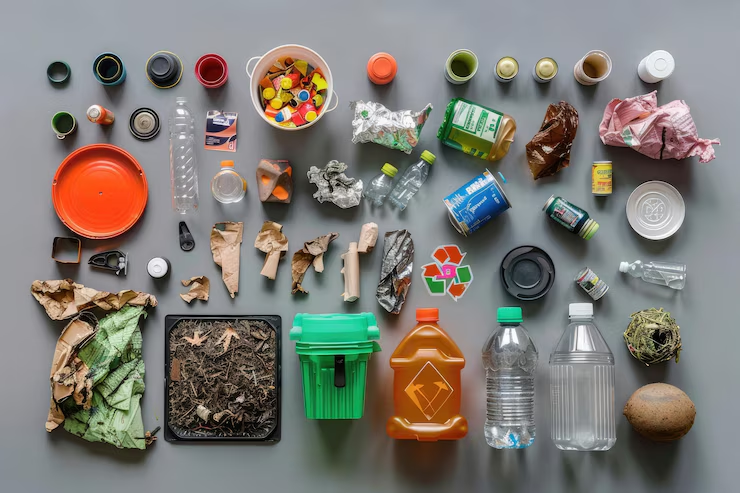
As we strive to reduce waste and protect our planet, recycling plays a crucial role in our efforts. However, some everyday items are more challenging to recycle than others, often due to complex components, special recycling requirements, or a lack of proper infrastructure. These hard-to-recycle materials can significantly hinder the recycling process, making proper junk removal and junk disposal essential. In this blog post, we’ll explore the most troublesome items that complicate recycling and provide practical solutions to reduce their environmental impact. Whether you’re cleaning out your home or managing waste, understanding how to dispose of these items responsibly can make a big difference in your eco-friendly efforts.
Materials like plastic bags, Styrofoam, and single-use coffee cups are major recycling hurdles, often ending up in landfills due to their complexity. At Provident Junk Removal, we tackle these challenges by offering responsible junk disposal in Vancouver, helping you reduce waste with eco-friendly alternatives. We’ll also explore how to properly handle hazardous items like electronics and fluorescent bulbs, ensuring safer and more sustainable waste management. Let’s make recycling easier and create a cleaner, greener future together!
1. Tetra Pak Cartons:
Tetra Pak cartons are a popular choice for packaging beverages like milk and juice, but their complex construction makes recycling a challenge. These cartons are made up of multiple layers of paper, plastic, and metal, which are difficult to separate during the recycling process. As a result, many Tetra Pak containers end up in landfills rather than being reused. While some specialized facilities can recycle these materials, the process is not always available or efficient. To help reduce their impact, consider opting for more sustainable packaging options or finding local recycling programs that accept Tetra Pak.
2. E-Waste:
As technology continues to evolve, so does the growing concern over e-waste. Electronics like smartphones, laptops, and televisions contain harmful substances such as lead, mercury, and cadmium, which can pose serious risks to both the environment and human health when not disposed of properly. Proper e-waste disposal is crucial to ensure these materials don’t end up in landfills, where they can leak toxins into the soil and water. Fortunately, electronics recycling offers a safer alternative by recovering valuable materials and reducing environmental harm. If you’re looking to recycle old electronics, make sure to choose a certified e-waste disposal service to safely handle and repurpose your unwanted devices.
3. Plastic Films & Bags:
Plastic bags and plastic film may be convenient, but they create significant challenges in recycling. Their thin, flexible nature makes them prone to getting tangled in recycling machinery, causing delays and costly breakdowns. As a result, most curbside recycling programs won’t accept them. Despite this, plastic bags and film shouldn’t be tossed in the trash either, as they can take hundreds of years to decompose in landfills. A better solution is to seek out dedicated plastic bag recycling bins, often available at grocery stores, or repurpose them for household use. Alternatively, consider switching to reusable bags or compostable alternatives to reduce your environmental impact.
4. Mirrors:
Mirrors are common in households, but their unique composition makes them a recycling challenge. Unlike regular glass, mirrors have a reflective coating applied to the surface, often made of metal or other materials, which complicates the recycling process. This coating prevents mirrors from being processed in standard glass recycling streams. Additionally, the presence of adhesives, frames, and other materials can further hinder proper disposal. Instead of tossing mirrors in the trash, consider donating them if they’re still in good condition, or take them to a specialized recycling center that handles non-standard glass items. If you’re unable to recycle them, safely dispose of broken mirrors by wrapping them in newspaper or cardboard to avoid injury.
5. Batteries:
Batteries power everything from smartphones to flashlights, but they also pose significant environmental risks if not disposed of properly. These small power sources contain hazardous chemicals and heavy metals like lead, mercury, cadmium, and lithium, which can leak into the soil and water when thrown in the trash or landfills, causing long-term pollution. In addition to their environmental impact, improperly disposed of batteries can pose a fire hazard, especially lithium-ion batteries. To avoid these dangers, always take your used batteries to a certified recycling center where they can be safely processed and their materials repurposed. Many retailers and local municipalities also offer convenient battery drop-off points, making it easier than ever to recycle these essential yet potentially harmful items.
6. Plastic Cutlery:
Plastic utensils, such as forks, knives, and spoons, are everyday conveniences, but they create major challenges in recycling. Typically made from low-quality plastics and mixed with other materials, these single-use items are difficult to process in standard recycling systems. Their small size and lightweight nature make them easily overlooked or unable to be properly sorted, which often leads to them being sent to landfills or incinerators. Worse still, many plastic utensils are not biodegradable, lingering in the environment for hundreds of years. To combat this issue, consider switching to reusable alternatives like bamboo or stainless steel utensils, or look for compostable options. For those times when plastic utensils are necessary, check if your local recycling program accepts them, or explore specialized facilities that handle plastic waste more effectively.
7. Pyrex and Ceramics:
Ceramics and Pyrex, found in many kitchens as dishes, cups, and bakeware, present unique challenges when it comes to recycling. Unlike regular glass, these materials are made from specialized compounds that give them durability and heat resistance, but also make them incompatible with standard glass recycling processes. The high melting point of Pyrex and the varied composition of ceramics make them difficult to break down and repurpose in conventional recycling facilities. As a result, they often end up in landfills. However, there are still ways to reduce their environmental impact. Consider donating intact items for reuse, or repurposing broken ceramics for creative DIY projects. If disposal is necessary, check with local recycling centers to see if they accept these materials, or seek out facilities that specialize in processing non-glass kitchenware.
Provident Junk Removal: Your Best Choice
When it comes to responsible waste disposal, choosing the right junk removal service can make all the difference. At Provident Junk Removal, we offer affordable junk removal solutions, including efficient garbage collection in Vancouver BC, and specialized trash removal services for tough-to-recycle items. Whether you’re in need of garbage pickup in Vancouver BC or a reliable haul away service for unwanted goods, our expert junk haulers are here to help. We prioritize environmentally conscious disposal and recycling practices, ensuring that your items are handled with care. Let us take the stress out of decluttering, contact Provident Junk Removal today for all your junk removal needs!



